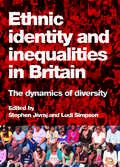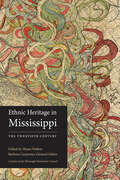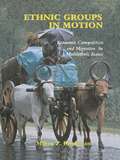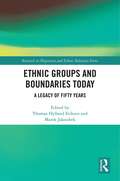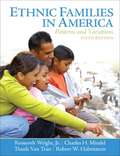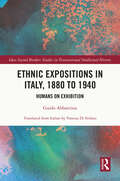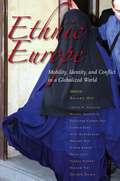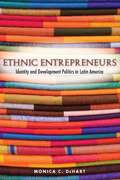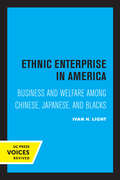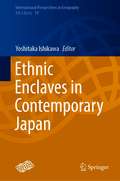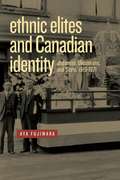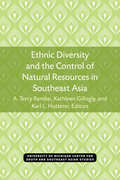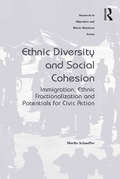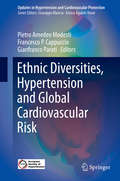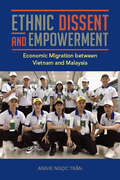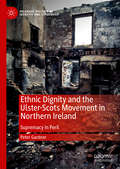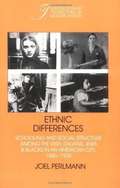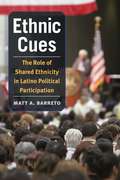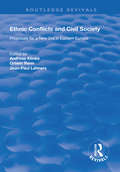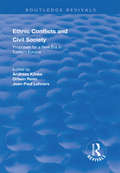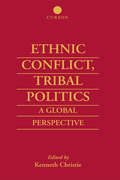- Table View
- List View
Ethnic Identity and Inequalities in Britain: The Dynamics of Diversity
by Edited by Stephen Jivraj and Ludi SimpsonAs debates around ethnic identity and inequality gain both political and media interest, this important book is the first to offer in-depth analysis from the last three UK population censuses focusing on the dynamics of ethnic identity and inequalities in contemporary Britain. While providing a comprehensive overview, it also clarifies concepts associated with greater ethnic diversity, increased segregation, exclusive growth of minority groups through immigration and a national identity crisis. The contributions, all from experts in the field based at or affiliated to the Centre on Dynamics of Ethnicity, highlight persistent inequalities in access to housing, employment, education and good health faced by some ethnic groups. The book will be a valuable resource for policy makers and researchers in national and local government, community groups, academics, students, and will act as an authoritative text to cite in reports, dissertations and funding applications.
Ethnic Heritage in Mississippi: The Twentieth Century
by Shana WaltonContributions by Linda Pierce Allen, Carl L. Bankston III, Barbara Carpenter, Milburn J. Crowe, Vy Thuc Dao, Bridget Anne Hayden, Joyce Marie Jackson, Emily Erwin Jones, Tom Mould, Frieda Quon, Celeste Ray, Stuart Rockoff, Devparna Roy, Aimée L. Schmidt, James Thomas, Shana Walton, Lola Williamson, and Amy L. YoungThroughout its history, Mississippi has seen a small, steady stream of immigrants, and those identities—sometimes submerged, sometimes hidden—have helped shape the state in important ways. Amid renewed interest in identity, the Mississippi Humanities Council has commissioned a companion volume to its earlier book that studied ethnicity in the state from the period 1500-1900. This new book, Ethnic Heritage in Mississippi: The Twentieth Century, offers stories of immigrants overcoming obstacles, immigrants newly arrived, and long-settled groups witnessing a revitalized claim to membership. The book examines twentieth-century immigration trends, explores the reemergence of ethnic identity, and undertakes case studies of current ethnic groups. Some of the groups featured in the volume include Chinese, Latino, Lebanese, Jewish, Filipino, South Asian, and Vietnamese communities. The book also examines Biloxi as a city that has long attracted a diverse population and takes a look at the growth in identity affiliation among people of European descent. The book is funded in part by a “We the People” grant from the National Endowment for the Humanities.
Ethnic Groups in Motion: Economic Competition and Migration in Multi-Ethnic States (Routledge Studies in Nationalism and Ethnicity)
by Milica Z. BookmanThis title focuses on one aspect of migration, namely its ethnic competition. Rather than observe population movements in general, the study is limited to the movements of specific ethnic groups. It explores the role played by ethnicity in determining which groups move and which groups stay.
Ethnic Groups and Population Changes in Twentieth Century Eastern Europe: History, Data and Analysis
by Piotr Eberhardt Jan OwsinskiThis unique reference traces the changing borders and ethnic balances that characterized the history of Eastern Europe during the twentieth century. After a preliminary overview, the book divides Eastern Europe into five regions, from the Baltic to the Balkans, and closely analyzes the ethnic structure of each region's constituent units over time. Summary chapters at the end of the volume present a comprehensive ethno-demographic portrait of the region at the start of the century, between the two world wars, and from the post-World War II period to the century's end. The volume is richly illustrated with more than sixty figures, hundreds of tables, and multi-lingual indexes of place names and ethnic groups.
Ethnic Groups and Boundaries Today: A Legacy of Fifty Years (Research in Migration and Ethnic Relations Series)
by Thomas Hylland Eriksen Marek JakoubekThe publication of Fredrik Barth’s Ethnic Groups and Boundaries marked a milestone in the conceptualization of ethnicity and ethnic groups and opened a new field of enquiry in the social scientific study of ethnicity. Ethnic Groups and Boundaries Today: A Legacy of Fifty Years demonstrates the enduring significance of the work, identifying its shortcomings and showcasing the state of the art today, fifty years after the publication of the groundbreaking original. Bringing together a team of leading contributors, all of whom have been inspired by Barth's theory and have made significant contributions of their own to the theorisation and research of ethnicity, this volume assesses the theoretical approach presented in Ethnic Groups and Boundaries, both in the context of its time and with the hindsight of the developments in the social sciences since then. It emphasizes the legacy of the original text and determines its significance, whilst identifying and elaborating on the main lines of the subsequent developments of the concept of ethnicity that were influenced by Ethnic Groups and Boundaries, but that have since developed and superseded the original. As such, it will appeal to scholars across the social sciences with interests in the concept and study of ethnicity.
Ethnic Groups And Boundaries: The Social Organization Of Culture Difference
by Fredrik BarthThis classic is regarded as the seminal text from which stems much current anthropological thinking about ethnicity. This text opens with Barth's invaluable thirty-page essay that introduces readers to important theoretical issues in the analysis of ethnic groups.
Ethnic Frontiers And Peripheries: Landscapes Of Development And Inequality In Israel
by Oren Yiftachel Avinoam Meir"The idea for editing this book originated during an international conference titled ""Regional Development: The Challenge of the Frontier,"" held in December 1993 at the Dead Sea and which was organized by the Negev Center for Regional Development at Ben-Gurion University of the Negev. In this conference we noticed that little has been said about the impact of Israel's complex mosaic of ethnic groups on the shaping of the country's social and spatial frontiers. We have therefore endeavored to bring together a number of perspectives on the evolution of ethnic frontiers in Israel and the role they play in shaping the cultural landscape of this country. Yet we later realized that ""frontier"" is too limited a term, and that it may through various processes have turned into a mosaic of spatial, social, economic, and political peripheries. More specifically we attempted to present the process of frontier development as perceived by Israel's ethnic and national minorities. We therefore invited contributions from various other Israeli experts on these issues: geographers, sociologists, anthropologists, and political scientists, which have now become the main body of chapters in this book. We trust that they are representative of the main dimensions of the subject."
Ethnic Families in America: Patterns and Variations
by Robert W. Habenstein Roosevelt Wright Charles H. Mindel Thanh Van TranReflecting the social and political dynamics in the United States, this edited volume offers an inclusive look at multicultural diversity in the U.S. with extensive coverage of the family life styles, traditions and values of seventeen American ethnic groups. <P><P>Providing unique and personal insights, each chapter is written by a contributing author representing a particular ethnic group and is structured in a similar pattern - covering the historical background, key ethnic cultural components, traditional and current ethnic family characteristics, and changes and adaptations to the ethnic family and culture. The book is suitable for undergraduate courses in Sociology of the Family, Sociology of Minority Groups, Social Work with Minority Groups, and Race and Ethnicity.
Ethnic Expositions in Italy, 1880 to 1940: Humans on Exhibition (Ideas beyond Borders)
by Guido AbbattistaComprehensively analyzing for the first time the phenomenon of ethnic living expositions in Italy between the 19th and 20th centuries, this book deals with the subject from a comparative European perspective and over the long term, studying analogies and differences in precedents as far back as the early modern age. The research, which seeks to go beyond the simplistic concept of "human zoos," intends to highlight the intentions, assumptions, and mechanisms of realization of the exhibitions of exotic living humans and the reactions from both the exhibited subjects and the public, exploiting a wide variety of heterogeneous sources capable of bringing out a kind of widespread popular ethno-anthropological ideas and the elements of racism contained in it. The book contributes to the understanding of Western mindsets and attitudes towards human diversity as they emerge from mass spectacular events that have over time become an international business. The present edition refers to the second Italian edition, containing an update discussing studies on the subject that have appeared between 2013 and 2021.Ethnic Expositions in Italy intends to fill a historiographical gap and to align Italian historiographies with European ones, which have long since come to terms with this legacy of the past and have explored its various historical manifestations in depth.This book is an excellent source for researchers and students alike, as well as those interested in the mechanisms that have helped shape European ideas and sensibilities on race and ethno-anthropological diversity.
Ethnic Europe: Mobility, Identity, and Conflict in a Globalized World
by Roland HsuOver the past several decades, Europe has become a destination for immigrants from all over the world. This volume examines the issues of ethnicity and immigration that face the European Union today, examining the struggle of EU nations to balance minority rights with social cohesion. Contributors look at issues including labor migration, strains on social welfare systems, separatist movements, the durability of local traditions, and the role of Islamic diasporas. Annotation ©2010 Book News, Inc. , Portland, OR (booknews. com)
Ethnic Entrepreneurs: Identity and Development Politics in Latin America
by Monica DehartIn order to understand the emergence and effects of ethnic entrepreneurs, DeHart (anthropology, U. of Puget Sound) traces the changing contours of development practice in Latin America, emphasizing how it has put ethnic cultural difference to work for development. She asks why and in what circumstances ethnic subjects have been identified as agents of economic development; and how the mobilization of ethnic cultural identity and practice for development solidifies, challenges, or transforms how ethnic agents perceive their own identity, community, and development goals. Annotation ©2010 Book News, Inc. , Portland, OR (booknews. com)
Ethnic Enterprise in America: Business and Welfare among Chinese, Japanese, and Blacks
by Ivan LightThis title is part of UC Press's Voices Revived program, which commemorates University of California Press’s mission to seek out and cultivate the brightest minds and give them voice, reach, and impact. Drawing on a backlist dating to 1893, Voices Revived makes high-quality, peer-reviewed scholarship accessible once again using print-on-demand technology. This title was originally published in 1972.
Ethnic Enclaves in Contemporary Japan (International Perspectives in Geography #14)
by Yoshitaka IshikawaThis book is the first work to comprehensively investigate the enclaves of non-Japanese residents in Japan. In a comparative study, it convincingly examines eight enclaves of five nationalities (Chinese, Korean, Filipino, Brazilian and Turkish) in twelve municipalities. Japan now leads in terms of depopulation in countries affiliated with the Organisation for Economic Co-operation and Development (OECD). The fact that the country has been supplementing the decreased number of Japanese nationals with an increase in migrants, who form enclaves, has attracted great attention. The temporal development and status quo of such enclaves are important concerns of researchers, policymakers and the general public. This publication is the result of joint studies by geographers and sociologists and contributes to a more detailed understanding of these topics. It thus represents a valuable achievement in the study of the segregation and enclave formation of minority nationalities. The empirical validity of existing explanatory frameworks, such as spatial assimilation and heterolocalism, is also discussed in a Japanese context.
Ethnic Elites and Canadian Identity: Japanese, Ukrainians, and Scots, 1919-1971
by Aya FujiwaraEthnic elites, the influential business owners, teachers, and newspaper editors within distinct ethnic communities, play an important role as self-appointed mediators between their communities and “mainstream” societies. In Ethnic Elites and Canadian Identity, Aya Fujiwara examines the roles of Japanese, Ukrainian, and Scottish elites during the transition of Canadian identity from Anglo-conformity to ethnic pluralism. By comparing the strategies and discourses used by each community, including rhetoric, myths, collective memories, and symbols, she reveals how prewar community leaders were driving forces in the development of multiculturalism policy. In doing so, she challenges the widely held notion that multiculturalism was a product of the 1960s formulated and promoted by “mainstream” Canadians and places the emergence of Canadian multiculturalism within a transnational context.
Ethnic Diversity and the Control of Natural Resources in Southeast Asia (Michigan Papers On South And Southeast Asia #32)
by A. Terry Rambo Kathleen Gillogly Karl L. HuttererThe authors consider the ways in which the high degree of ethnic diversity within the region is related to the nature of tropical Asian environments, on the one hand, and the nature of Southeast Asian political systems and the ways in which they manipulate natural resources, on the other. Rather than focus on defining the phenomenon of ethnicity, this book examines the different social evolutionary contexts in which the phenomenon is manifested. Companion volume to Cultural Values and Human Ecology in Southeast Asia (Michigan Papers no. 27).
Ethnic Diversity and Social Cohesion: Immigration, Ethnic Fractionalization and Potentials for Civic Action (Research in Migration and Ethnic Relations Series)
by Merlin SchaefferExploring the debate within social sciences on the consequences of ethnic diversity for social cohesion and the production of public goods, this book draws on extensive survey data from Germany to engage with questions surrounding the relationship between ethnic diversity and issues such as welfare provision and the erosion of public trust and civic engagement in Europe. It moves away from the question of whether there is in fact a universal correlation between ethnic diversity and social cohesion in order to focus on the reasons for which people's reciprocity and trust might be reduced in more ethnically diverse areas. Drawing attention to the importance of peoples' perceptions of diversity in explaining levels of social cohesion, Ethnic Diversity and Social Cohesion shows how specific types of perceived diversity can help explain the reasons for which ethnic diversity is associated with declines in social cohesion, and the contexts and conditions in which this occurs. The book also outlines potential courses of action, revealing the important roles of residential segregation, children and interethnic partners in overcoming barriers of language, values and cognitive bias. A rigorous, timely study of ethnic diversity and its relation to liberal democracy as a form of deliberative conflict that requires certain levels of trust, shared values and engagement, Ethnic Diversity and Social Cohesion will be of interest to policy makers, sociologists and political scientists working in the fields of race and migration, ethnic diversity and community cohesion.
Ethnic Diversity and Economic Instability in Africa
by Hiroyuki Hino John Lonsdale Gustav Ranis Frances StewartThere is growing consensus in the development economics literature that ethnic diversity is a very significant factor in explaining Africa's poor economic performance. Ethnic Diversity and Economic Instability in Africa challenges this conventional wisdom. Drawing on the insights of historians, anthropologists and political scientists as well as development economists, this book questions whether ethnicity is the most useful organising principle by which to examine the economic development of Africa, arguing that it is a more fluid and contingent concept than economic models allow. Instead, the authors explore the actual experience of ethnicity in Africa and propose new methods of measuring ethnic diversity and inequalities. Finally some tentative conclusions are reached regarding appropriate policy reforms.
Ethnic Diversities, Hypertension and Global Cardiovascular Risk (Updates in Hypertension and Cardiovascular Protection)
by Pietro Amedeo Modesti Francesco P. Cappuccio Gianfranco ParatiIn the context of the most significant influx of migrants in European history, the objective of this book is to provide healthcare professionals with essential knowledge and skills to effectively treat and prevent cardiovascular diseases in ethnic minorities. Acknowledging that the scientific and cultural training of health professionals on the specific health needs of minority groups is still limited and likely biased, the book sheds light on the different health policies in European countries as well as epidemiologic data on cardiovascular events among migrants. In addition, it presents an in-depth analysis of potential ethnic-group-specific drivers of global cardiovascular risk within this new and challenging framework – as well as issues related to its prevention and treatment.The prevalence of hypertension, diabetes, chronic kidney disease, obesity, and metabolic syndrome is found to be higher among most minority groups than in the native population, yet their access to treatment and health services may be limited by cultural and language barriers. As health professionals are confronted with such intercultural challenges on a daily basis, specific training and dedicated publications are thus essential to accompany and foster a constructive development towards a pluralist and healthier society. This book addresses that need, offering a unique and revealing resource.
Ethnic Dissent and Empowerment: Economic Migration between Vietnam and Malaysia (Studies of World Migrations)
by Angie Ngoc TranVietnam annually sends a half million laborers to work at low-skill jobs abroad. Angie Ngọc Trần concentrates on ethnicity, class, and gender to examine how migrant workers belonging to the Kinh, Hoa, Hrê, Khmer, and Chãm ethnic groups challenge a transnational process that coerces and exploits them. Focusing on migrant laborers working in Malaysia, Trần looks at how they carve out a third space that allows them a socially accepted means of resistance to survive and even thrive at times. She also shows how the Vietnamese state uses Malaysia as a place to send poor workers, especially from ethnic minorities; how it manipulates its rural poor into accepting work in Malaysia; and the ways in which both countries benefit from the arrangement. A rare study of labor migration in the Global South, Ethnic Dissent and Empowerment answers essential questions about why nations export and import migrant workers and how the workers protect themselves not only within the system, but by circumventing it altogether.
Ethnic Dignity and the Ulster-Scots Movement in Northern Ireland: Supremacy in Peril (Palgrave Politics of Identity and Citizenship Series)
by Peter GardnerIn this book, Peter Gardner contends that the production of narratives of ethnic peoplehood is an attempt to regain a sense of collective dignity among the previously dominant. After introducing the concept of ethnic dignity and locating its place within postconflict identity politics, Gardner focuses his analysis on the Ulster- Scots story of peoplehood. Drawing on a wealth of primary data, the chapters explore a variety of core issues including ethnopolitics, social class, political-economic ideology, colonialism, and heteromasculinity. The book concludes by taking a global view of post-conflict ethnic dignity among the once dominant, analysing the New Afrikaans movement in South Africa, white pride and ethnic whiteness studies, and Maronite Phoenicianism in Lebanon. This will be an important contribution for students and scholars of ethnicity, divided societies and, more broadly, political sociology.
Ethnic Differences: Schooling And Social Structure Among The Irish, Italians, Jews, And Blacks In An American City, 1880-1935 (Interdisciplinary Perspectives On Modern History)
by Joel Perlmann Robert Fogel Stephan ThernstromEthnic Differences, first published in 1989, explores how and why the Irish, Italians, Jews, and blacks of Providence, Rhode Island differed in their schooling and economic success. Drawing on evidence from thousands of students records of public, Catholic, and private schools, as well as on census manuscripts, city directories, and other sources, the book offers an integrated study of American ethnicity, education, and social structure. Joel Perlmann examines the extent to which differing career patterns, and reconsiders the relation between ethnicity and social class.
Ethnic Cues: The Role of Shared Ethnicity in Latino Political Participation
by Matt A. Barreto"Matt Barreto investigates some of the ramifications of two new related developments in American political life: the stunning growth of the Latino immigrant population in recent decades and the accompanying exponential explosion in the number of Latino candidates running for political office at the local, state, and national levels. " ---Reuel Rogers, Northwestern University Until recently, much of the research on political participation has resisted the idea that Latino voters rely on ethnic cues. The discussion has become increasingly salient as political strategists have learned to define individual voting blocs and mobilize them in support of a candidate. Nourished by the debate over immigration, the search for the Latino voter has now blossomed into a national political obsession. Against this background, Matt Barreto assays the influence of ethnic identification on Latinos' voting behavior. Barreto asks whether the presence of co-ethnic candidates actually does mobilize Latino voters in support of these candidates. His analysis of in-depth candidate interviews, public opinion surveys, official election results, and statistics finds that it does. He goes on to describe the dynamic of voting in the Latino community and sharpens our appreciation of how ethnic considerations influence the electoral choices of Americans more generally. In a time of intensely focused campaign appeals, Barreto's work has much to tell us about the mechanics of public opinion and the role of race and ethnicity in voting behavior. Matt A. Barreto is Associate Professor of Political Science at the University of Washington and Director of the Washington Institute for the Study of Ethnicity, Race, and Sexuality (WISER).
Ethnic Conflicts and Civil Society: Proposals for a New Era in Eastern Europe (Routledge Revivals)
by Andreas Klinke Ortwin Renn Jean-Paul LehnersPublished in 1997. After the collapse of the communist system, the political systems in Eastern Europe were unable to cope with increasing tensions between ethnic majorities and minorities. These tensions led to violent ethnic conflicts and civil wars, in particular in former Yugoslavia. In this phase of transition and nation-(re)building, ethnic groups strove for more political autonomy and even territorial secession. The newly independent states lacked democratic structures and traditions as well as civil manners that could be used for regulating ethnic conflicts. The idea of Civil Society provides both basic democratic mechanisms for a lasting co-existence in an ethnically plural society. The theoretical part of this book discusses the issues of conflict anatomy, causes for conflict, and democratic conflict resolution. The empirical part describes experiences of ethnic conflicts in former Yugoslavia (especially Slovenia, Croatia and Serbia) in Ukraine and Romania. Experiences from Switzerland and the United States demonstrate successful examples of ethnic conflict management and illustrations of the political culture within a Civil Society.
Ethnic Conflicts and Civil Society: Proposals for a New Era in Eastern Europe (Routledge Revivals Ser.)
by Andreas Klinke Ortwin Renn Jean-Paul LehnersThis title was first published in 2000: The papers presented in this volume are based on the discussions of a workshop which asked: how can ethnic and political cooperation be accomplished in ethnically and politically heterogeneous countries after the collapse of the communist regimes which left a void for nationalist and even chauvinist movements? The objectives are: to promote a better understanding of the contemporary "ethnic" conflicts and their social, cultural and political causes; to determine the historical, structural and political developments that have led to or intensified these conflicts; to analyze and develop positive role models for coping with such conflicts; to provide constructive proposals for future conflict resolution mechanisms; and to identify the crucial elements for building trust-generating institutions on the basis of the civil society model. The papers address ethnic conflicts in Eastern Europe, with a particular focus on the former republics of Yugoslavia. They aim to go beyond the analysis of causes and manifestations of such conflicts and to offer constructive ideas for the post-Civil-War period.
Ethnic Conflict, Tribal Politics: A Global Perspective
by Kenneth ChristieThere is an urgent need for a book which combines the approaches of political science/sociology and history and particularly comparative politics with ethnic studies. There are currently many rapid and significant changes taking place in the world political map in terms of ethnic conflict. How do we explain these changes? How do we analyse them? How can we compare them? How do we make sense of the different ethnic conflicts that have taken place since the end of the Cold War, in what some observers have dubbed 'the New World Order'? Few books on the market combine the diverse approaches of political science, sociology and history at any level of analysis. This work will remedy at least some of the deficiencies in the existing literature and be truly interdisciplinary in nature.
